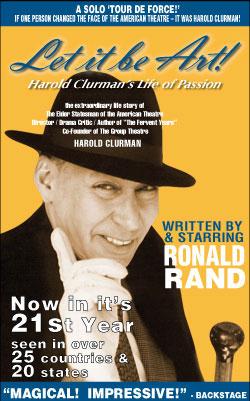Jeanie Thompson
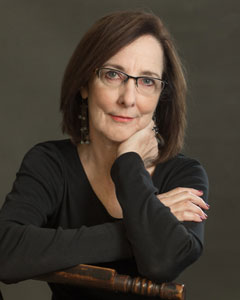 Executive Director of the Alabama Writers Forum, a statewide literary arts service organization, and Founder of the ‘Writing Our Stories’ creative writing program for at-risk youth within the AWF. Ms. Thompson, an award-winning poet, has published five collections of poetry, The Myth of Water, Poems from the Life of Helen Keller (2016 Foreword INDIES Book of the Year Awards, Finalist in Poetry), The Seasons Bear Us, White for Harvest: New and Selected Poems, Witness (Publishers Marketing Association’s Benjamin Franklin Award), and How to Enter the River, and three chapbooks. She co-edited The Remembered Gate: Memoirs by Alabama Writers with Jay Lamar. Her poems, interviews with writers, and critical articles have appeared in Antaeus, Crazyhorse, Ironwood, North American Review, New England Review, PoemMemoirStory (Nelle), Southern Review, The Louisville Review, and numerous anthologies. Ms. Thompson was Founding Editor of the literary journal Black Warrior Review at The University of Alabama. She is also a poetry faculty member with the Spalding University low-res MFA Writing Program in Louisville, and has taught as a literary arts education advocate at the University of New Orleans, the New Orleans Center for the Creative Arts, the poetry-in-the-schools program in New Orleans, and across Alabama. Ms. Thompson has received Individual Artist fellowships from the Louisiana State Arts Council and the Alabama State Council on the Arts and was a Walter Dakin Fellow at the Sewanee Writers Conference. www.jeaniethompson.net, writersforum.org, writersforum@bellsouth.net
Executive Director of the Alabama Writers Forum, a statewide literary arts service organization, and Founder of the ‘Writing Our Stories’ creative writing program for at-risk youth within the AWF. Ms. Thompson, an award-winning poet, has published five collections of poetry, The Myth of Water, Poems from the Life of Helen Keller (2016 Foreword INDIES Book of the Year Awards, Finalist in Poetry), The Seasons Bear Us, White for Harvest: New and Selected Poems, Witness (Publishers Marketing Association’s Benjamin Franklin Award), and How to Enter the River, and three chapbooks. She co-edited The Remembered Gate: Memoirs by Alabama Writers with Jay Lamar. Her poems, interviews with writers, and critical articles have appeared in Antaeus, Crazyhorse, Ironwood, North American Review, New England Review, PoemMemoirStory (Nelle), Southern Review, The Louisville Review, and numerous anthologies. Ms. Thompson was Founding Editor of the literary journal Black Warrior Review at The University of Alabama. She is also a poetry faculty member with the Spalding University low-res MFA Writing Program in Louisville, and has taught as a literary arts education advocate at the University of New Orleans, the New Orleans Center for the Creative Arts, the poetry-in-the-schools program in New Orleans, and across Alabama. Ms. Thompson has received Individual Artist fellowships from the Louisiana State Arts Council and the Alabama State Council on the Arts and was a Walter Dakin Fellow at the Sewanee Writers Conference. www.jeaniethompson.net, writersforum.org, writersforum@bellsouth.net
As the Executive Director of the Alabama Writer Forum, how did the Forum begin and how does it work with writers and the community?
We started the Forum in 1993, under the mentorship of Al Head, executive director of the Alabama State Council on the Arts, who had a vision for a literary arts partnership. We’ve partnered with universities, community colleges, historical institutions, and other adjacent groups to create awards and produce many kinds of literary programs.
The goal is to promote writers, writing, publishing, and teachers of creative writing and for Alabamians, and the rest of the world, to know the best and brightest Alabama writers – to create an atmosphere of literature in the cultural community. It doesn’t happen overnight, but after all these years, I can look back and be proud of what we’ve done.
People all over the world know about Harper Lee, Truman Capote, Winston Groom, and others, but we have so many talented writers yet to be known, and I’m always interested in finding them.
You were one of the special guest speakers at the 125th Birthday Celebration of the Helen Keller Public Library in Tuscumbia, Alabama, celebrating the history of the library, the first library in the state of Alabama, in 2018. At the celebration an original portrait of Helen Keller and Annie Sullivan by world-renowned portrait artist Martha Carpenter was unveiled, and there were also speeches by Tuscumbia Mayor Kerry Underwood; Dave Power, President of the Perkins School of the Blind; and Keller Johnson Thompson, a descendant of Helen Keller and Vice President for Education of the Helen Keller Eye Foundation. What did it mean to you being a part of such a special celebration for the Helen Keller Library?
 Taking part in the Helen Keller Library’s 125th anniversary in Tuscumbia in October 2017 was meaningful to me because Helen and Anne Sullivan Macy were really responsible for bringing that library into being.
Taking part in the Helen Keller Library’s 125th anniversary in Tuscumbia in October 2017 was meaningful to me because Helen and Anne Sullivan Macy were really responsible for bringing that library into being.
Helen wrote to her mother from Boston, so the story goes, and asked why there was no place in Tuscumbia where people could find books, sit among books, etc. Helen had had that enriching experience in Boston where she went to the Perkins School to continue her education. She was very young when she wrote the letter – about 12. The ladies in Tuscumbia’s literary club, including Helen’s mother, set about the project. Helen and Anne donated books, as the plaque outside the library states.
For me it was significant because it is a library – a place of reading, words, thought, meaning, human interaction. I had been invited there because of my collection of poems inspired by Helen but I was not the main point by any means. So, the event pulled all of the experiences of The Myth of Water into one succinct moment in time for me.
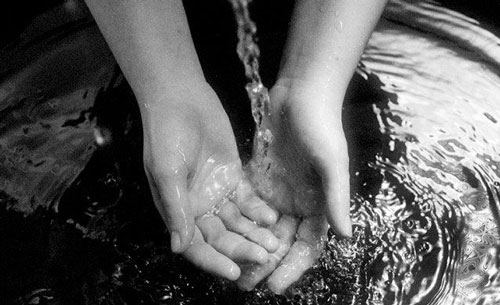
Photo from Jeanie Thompson’s book, “The Myth of Water.” Photo by Wayne Sides
It was about reading and giving communities access to books, and that is very much in the spirit of Helen Keller’s belief in human rights. And the backdrop for the day’s program was the lovely portrait of Helen and Anne that had been executed by Martha Carpenter. So, Helen was among us in body, in a sense, as well. It was a very moving experience.
It was a delight listening to you read from your new book The Myth of Water: Poems from the Life of Helen Keller at The Helen Keller Library during the Helen Keller Festival. How did your writing these poems first come into your consciousness?
First, I was delighted to be invited to the 2018 Helen Keller Festival as Guest Lecturer, and especially being able to read from my book at The Helen Keller Library. Libraries have always been very important to me. My mother, who grew up in Tallassee, Alabama was a library board member in Decatur.
Photo below by Wayne Sides
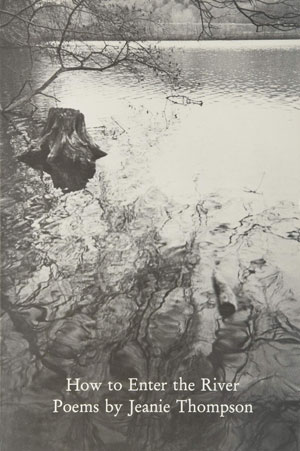 Decatur was my home from the time I was four until I went to the University of Alabama. And growing up in North Alabama was a beautiful place to grow up in, but it was a bit culturally repressed, although many important writers, musicians and artists have come from this rich soil.
Decatur was my home from the time I was four until I went to the University of Alabama. And growing up in North Alabama was a beautiful place to grow up in, but it was a bit culturally repressed, although many important writers, musicians and artists have come from this rich soil.
Alabama is a problematic state because it has such a checkered past and a complicated history. It also has tremendously talented people in the arts, and in education, and some people in the state are passionate fighters for justice. All those things are important to me. We're so talented here, and yet we get tripped up in all of these issues that we have, but I don't think that Alabama’s really that different from a lot of places.
In regards to The Myth of Water: Poems from the Life of Helen Keller, it actually began after I read Helen Keller’s book, A Light in my Darkness and I began to feel a certain resonance with her. What touched me especially was her spirituality.
I also read Dorothy Hermann’s biography, Helen Keller, A Life. It all felt as if the universe was pointing me in a certain direction. At that time, I wasn’t sure what I was actually going to write, whether it would become a film or a play. As I continued reading, I wrote three or four poems in France, not set there. I had to go all the way from Alabama to France to start the work.
You felt a special affinity to Helen Keller’s life story?
It was easy for me to feel connected to her story. She was from Alabama, of course, and she was always somebody that people looked up to. She was born in Tuscumbia, Alabama, which is in the northwest part of the state, and I was from Decatur, which is in the north-central part of the state. The Tennessee River flows through both of these towns, so that's where the river imagery in the book comes from because I had lived on the same river.
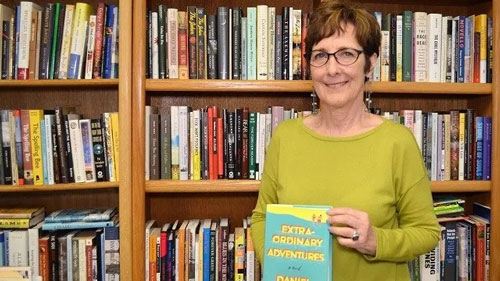
Jeanie Thompson holding a book by Daniel Wallace, 2019’s recipient of AWF's Harper Lee Award. (photo: Michael Tomberlin/Alabama NewsCenter)
Then as I was reading Dorothy Herman’s book, I discovered that her sister Mildred Keller Tyson once had a home in Montgomery. As it turned out, Mildred’s house was only a few blocks from where I was living at the time. What I learned that kickstarted the whole thing was that Helen had fallen in love with a man named Peter Fagan.
When Annie Sullivan was ill and couldn't be Helen’s teacher and companion any longer, Peter, Annie’s estranged husband, became Helen’s attendant. Helen's mother didn’t want her to marry Peter and brought her back to Montgomery. Helen and Peter made plans to elope, but he didn't show up to meet her the night they were supposed to leave town to be married.
As I researched going through her biographies, her letter and other books she wrote, I felt I was getting to know her, getting inside her head, what she thought, how she felt. She became a dimensional character to me. I would research a particular time in her life, like when she went to Japan, and I'd immerse myself in it. After two or three hours, I would begin to get an idea for a poem, and work on it.
Coming to Tuscumbia for the Helen Keller Festival certainly must have brought you in touch with a host of special experiences.
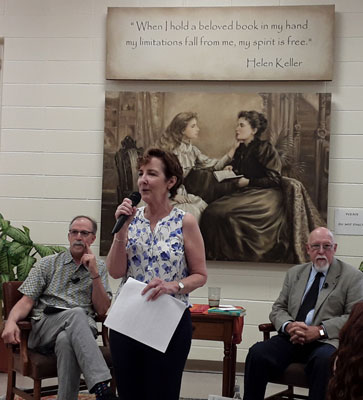
Jeanie Thompson introducing Don Noble interviewing Daniel Wallace at the Helen Keller Public Library’s “Writers Readers Program” on June 28th, 2019
When I came to The Helen Keller Festival, Tammie Collins (the Library Director) and I had planned a week of activities for me as “poet-in-residence,” and I was able to connect with a lot of wonderful people, such as Johnny and Doris Tuten, who were very connected to the historic preservation of Ivy Green, Helen Keller’s birthplace.
I also had meetings with the Civitan Club, the Lions Club and the Kiwanis Club. I hoped to make them aware of the importance of writing and poetry in people’s lives. I’d ask them: “Are your children the best writers they can be?”
I wanted to talk about your unique collaboration with photographer Wayne Sides, and the astounding art collage and poetry installation at the Helen Keller Library in Tuscumbia, Alabama, “I Wake from a Dream.” How did that initially come about?
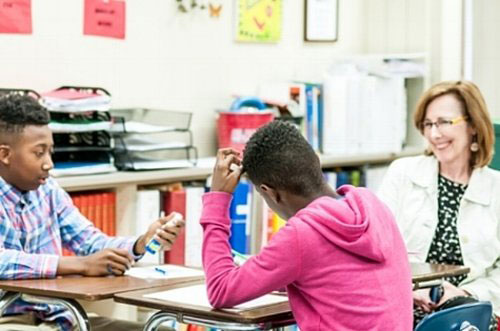
Jeanie Thompson with students from Montevallo Middle School, participants in the Writing Our Stories program.
Wayne is a brilliant photographer whom I met at the University of Alabama in the 1970’s. We have worked together since then on various projects involving photography and poetry.
I had asked him if he could make a few images from some of my poems. When he agreed, I sent him some lines to start with and he ended up creating an entire installation! I was astounded by what emerged.
It certainly means a great deal to you to reach out to young people and make them aware of poetry and writing. How did the ‘Writing Our Stories’ program begin?
The arts are vital to human life to experience and participating in the arts can be life changing. ‘Writing Our Stories’ is a creative writing program in the School District of the Alabama Department of Youth Services, and in the 7th grade classes of three middle schools in Shelby County.
The program began in 1997 and is built on a series of partnerships – between DYS, the Alabama Writers’ Forum. The Shelby County Arts Council and Shelby County Schools. Over the years, we’ve taught a skills-based curriculum of poetry and fiction and have been able to bring published writers to talk and teach in the classrooms. It’s been very encouraging seeing the growth of the students work, and we been able to publish many students’ books and chapbooks.
I started writing at fourteen and it saved me from the pettiness of high school society. I look back now and realized I was severely bullied by gossip. We didn’t know what to call it then, but it felt the same. I was different, sort of up in my head, and not in one of the high school sororities. That alone made me a target.
But I had something I could hold on to that was mine alone. I wasn’t very good because I had no formal instruction. Once I got into classes as an undergraduate at UA, I started to understand a lot more about how to write and the importance of reading other poets, listening to wiser, older teachers, and starting to develop my voice. This can be a safety net against all kinds of hazards for a young person.
Today it is so much harder for young people because of social media and other pressures. We need the arts in schools more than ever, and yet in Alabama less than 50% of our public schools have an arts specialist. It’s a constant struggle that all of us working with arts education in various ways are making progress. The Alabama Arts Alliance, directed by Donna Russell in Montgomery, is one of the champions of this movement.
I had taught poetry in the schools in New Orleans years before and loved the idea of the ‘poet in the school’ concept, where a poet goes in the classroom, teaches a lesson, and then the teacher in the classroom observes this and can do it herself or himself. I modeled ‘Writing Our Stories’ on what I had done before. We’ve published more than eighty books of youth poems and fiction. This program is my “heart and soul” at the Forum. Nurturing it has has kept me nurtured as an executive director for more than 25 years!
How do you begin to help a student write a poem?
I try and help them understand how a poem works as we take it apart. I go through an analysis process, and it feeds my own writing.
People tend to think about Harper Lee, Truman Capote, and there are so many other writers to celebrate. There’s something magical and sacred about a book. How you encounter it is not the same way as you approach a screen and watch a movie or a TV show.
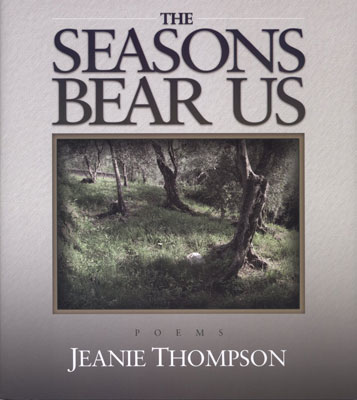
Photo by Wayne Sides
You feel strongly that arts in the schools make a difference in the lives of young people.
I believe children and youth should have arts in the schools because that’s the only way you can really be a well-rounded person. I know when I was in elementary school, we had chorus in the music room where there was a piano, we put on plays for holidays, we made things with construction paper. I remember my 5th grade teacher’s cabinet full of arts supplies that we could access anytime we wanted.
That is not the case in many Alabama schools today and that is a tragedy. Luckily we have leadership in the Alabama State House now that understands the importance of arts education so funding is flowing for that but there’s no guarantee it will continue in the future. Thanks to our arts leadership across the state, it has a good chance, but the advocacy is never-ending.
A child’s imagination is what it’s all about. A person will not be a great scientist if he or she doesn’t have an imagination. Lack of imagination is a main reason that we have some of the problems we have in this country today – especially related to not seeing the world from someone else’s point of view. If you cannot imagine the pain of poverty, you won’t be moved to try to alleviate it – that’s just one example.
If we can’t, as a society, imagine a better, more humane world, we won’t make any changes. During the time of Coronavirus, we see this played out every day.
Writing and the arts are certainly helping us get through this bleak time of separation in the spring of 2020. I have though a lot about what Helen Keller would do in a pandemic. I think she would hold her head up and tell us to do the same.
But she wouldn’t gloss over the pain. She experienced the horror of war, not unlike a pandemic. Helen visited wounded veterans after WW2 and she also visited Hiroshima and Nagasaki in 1948 and felt the devastation of twisted buildings and scarred faces and the rubble under her feet. She writes eloquently about this in a letter to a friend back in the United States.
As a writer, Helen was always engaged, constantly exhorting people to do better, to be better citizens and more compassionate human beings. That’s my ‘take away’ as I have written about her and hope to write more in the future. I aspire to be as fully engaged in life as Helen Keller.
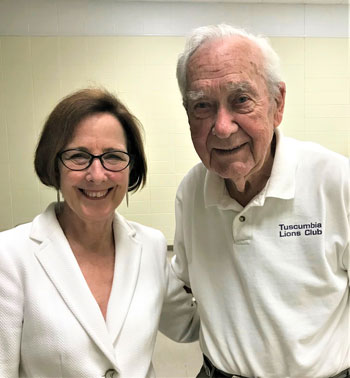
Jeanie Thompson with John Tuten, Ivy Green Board Member at the Lions Clubs’ meeting, June, 2018 at the Helen Keller Library, Tuscumbia, Alabama (photo: Helen Keller Public Library)









































